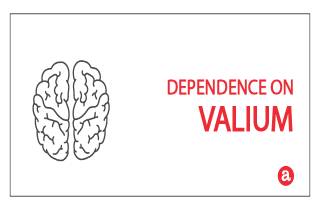Think you may be dependent on Valium?
You’re not alone. But just because you have developed dependency to Valium doesn’t mean you’re addicted. Valium (diazepam) is a benzodiazepine used to provide short-term relief for anxiety. The longer you take Valium, the higher likelihood you have of developing a dependency to the medication. Dependency results in side effects stop taking Valium. That is why diazepam is only prescribed for the short term.
People really like Valium, though, and will continue to use long past what is considered appropriate. (Or, they won’t follow the proper tapering procedures.) This may mean that you have become physically dependent on Valium. So what exactly is Valium dependence? How does it affect you physically and mentally and what is withdrawal from Valium like? In this article, we’ll explore the difference between dependence on Valium and addiction. And if you have any questions that haven’t been answered, please, ask them in the comment sections below.
Valium dependence time: How long to be dependent on Valium?
Valium is one of those drugs which is both strong and has a high dependency rate. That is, the body becomes dependent to diazepam faster than other drugs on the market. If you use valium as directed, your body is not going to develop a dependence as fast as compared to someone who uses Valium over a long time. In fact, dependence on Valium may take several weeks or months to develop depending on dose and frequency of administration. Physical dependence on diazepam will last as long as you continue to take Valium. While Withdrawal From Valium (diazepam) is not pleasant, once it’s over, your body will no longer need diazepam to function and you’ll no longer be Valium-dependent.
Dependence on Valium symptoms
You can notice a dependency to Valium in a few ways. In general, if withdrawal symptoms occur when you diazepam dosage, lower frequency of diazepam dosing, or stop taking Valium altogether, you have developed a dependency to Valium. Signs to be on the lookout for include:
- experiencing withdrawal symptoms when you stop taking Valium
- increased tolerance for diazepam, or needing more diazepam to achieve original therapeutic effect
- taking Valium to avoid withdrawal symptoms
Physical dependence on Valium
Dependence on Valium is the physical need to take Valium in order to feel normal. You can know if you’re dependent on Valium by the presence of withdrawal symptoms when you abruptly stop taking Valium or reduce dose amounts or frequency. Withdrawal symptoms include reactions in the body as it tries to function without diazepam and achieve homeostasis. The longer you use Valium, the more your body will get used to functioning with it in the system. Look out for withdrawal symptoms any time there is a change in your Valium use.
Valium dependence withdrawal
Once you’ve developed a dependence on Valium, expect to experience withdrawal when you stop taking Valium. Valium dependence withdrawal can manifest as early as a few hours after your last dose has worn off. The intensity of Valium dependence withdrawal depends on the level of dependence your body has developed. Below is a list of symptoms you may encounter at any time during your experience of withdrawal. But note that there are ways to treat Valium dependence withdrawal symptoms. This can help the severity of your withdrawal and ease any discomfort you will feel.
- abdominal pains
- tremors
- sweating
- headache
- muscle pain
- extreme anxiety
- tension
- restlessness
- dysphoria
- insomnia
- tingling of extremities
Psychological dependence on Valium
It may also be possible that you have become pyschologically dependent on Valium, even during prescribed use. If you’re psychologically dependent on hydrocodone you will:
- Experience strong Valium cravings
- Feel the need to take Valium to cope with minor anxiety
- Feel compelled to use Valium and obssess about use
- Use Valium even in the presence of negative consequences
If you experience psychological dependence on Valium, reducing your dosage of diazepam or stopping Valium cold turkey may not be enough to quit Valium for good. You may want to seek out behavioral treatment to help address issues which compel Valium use. Psychologists or psychiatrists specializing in chemical dependency issues can also help diagnose other mental health issues which may be present. Psychiatrists, (who are medical doctors) can also help you figure out other medications that would work best for residual anxiety and can prescribe other medicines while treating Valium addiction.
Valium dependence vs addiction
Dependence to Valium occurs when your body has developed a need for the medication in the body. The body has grown used to the presence of diazepam in the system and needs it to behave and function normally. Dependence can develop at any time you are taking Valium as a medication. Dependence is more likely if you use Valium past what is intended or if you’re using it for recreational or addictive purposes. But while you may be dependent on Valium, this might not mean you are addicted to Valium. Addiction has deeper psychological characteristics beyond physical dependency of Valium. If you think you or someone you know is addicted, look for drug seeking behavior or if their valium use is effecting their lives negatively. Then, seek help with you family doctor or a medical professional who specializes in the treatment of chemical addictions.
Valium dependence questions
Do you still have questions about Valium dependence and addiction? We invite you to leave us your questions about dependence on Valium below. We welcome all questions and try to answer each one personally and promptly.









Related Posts